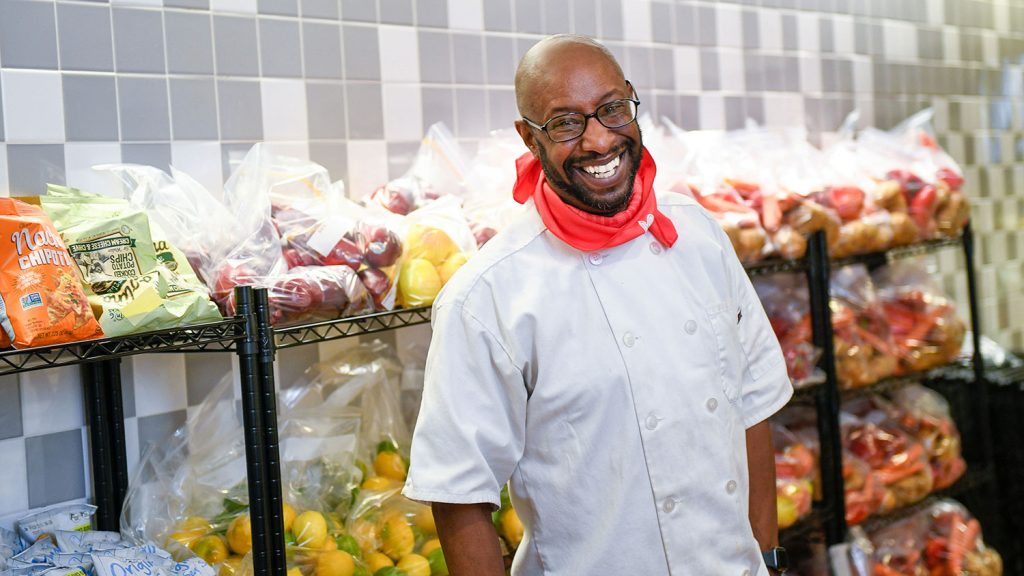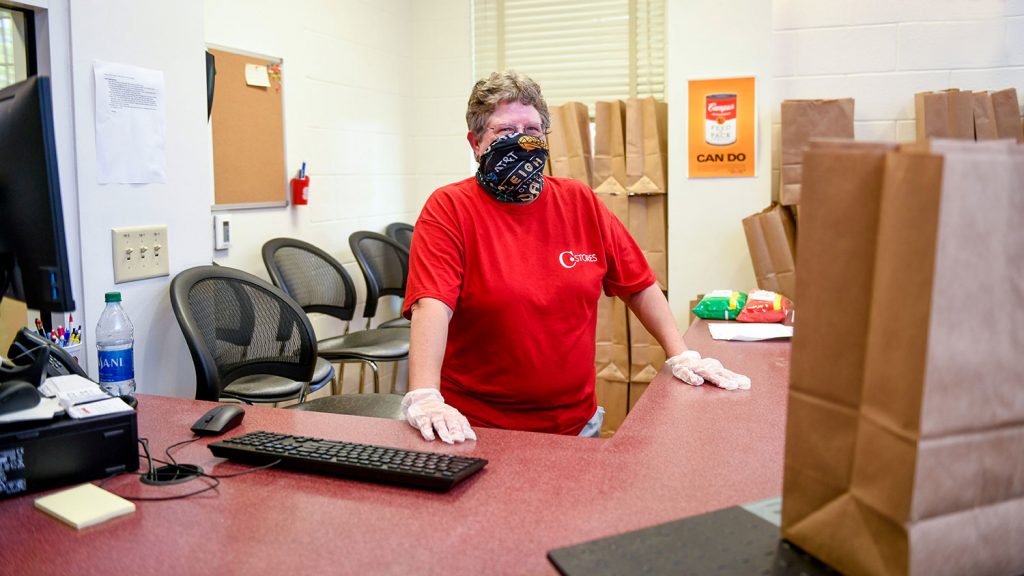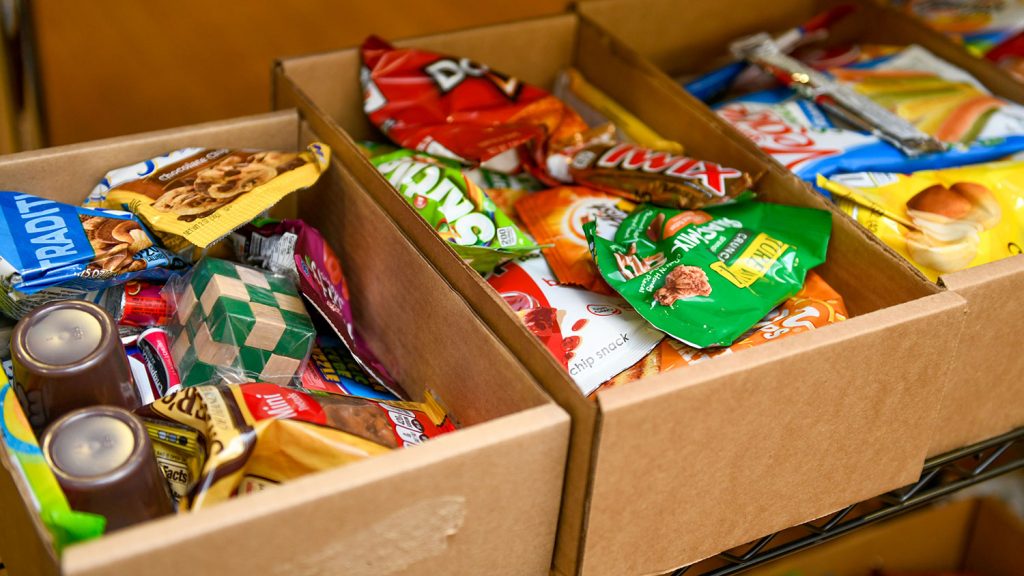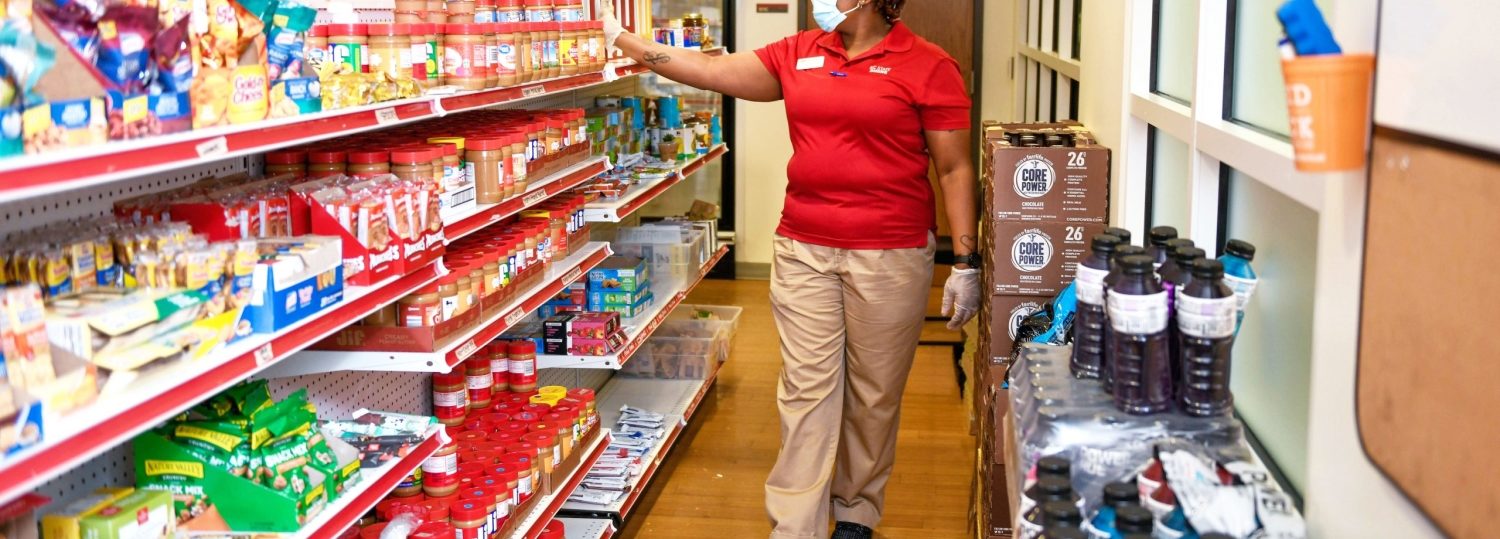When the news broke that NC State’s operations would shift dramatically in response to COVID-19, the team that runs the Feed the Pack Food Pantry kicked into high gear.
Feed the Pack — led by a student team with the guidance of its advisory board — extended the pantry’s reduced spring break hours for an extra week while quickly trying to determine what to do after that.
“Everything happened at lightning speed,” says Melissa Green, director of leadership and civic engagement for the Division of Academic and Student Affairs and one of the several founders of the food pantry. “Over the course of about two days — although it felt like a lot longer — we had a lot of conversations with the student leadership team about whether it was safe to remain open.
“We were all concerned about potentially exposing folks who are the most vulnerable and already at the margins of our society. And we had to weigh that against the fact that the food pantry is one of the most critical resources on campus right now, and our mission is to serve our NC State community through addressing issues of food insecurity facing our students, staff and faculty.”
Although the student leadership team is not physically on campus, they’ve been actively involved in the effort, providing critical information about how the pantry operates to the NC State employees who are pitching in to manage it now.
“We are indebted to these students for their incredible work, passion and commitment to Feed the Pack,” Green says. “As the pantry continues to operate during this time, it is because of the high level of leadership our student leaders have shown and the work they have done for the past eight years to operate this critical resource that serves our NC State community.”
‘A Huge Outpouring of Support’
To prepare for increased demand, DASA and Campus Enterprises came together to develop a plan.
Shawn Hoch, senior director of dining and hospitality services, connected the food pantry with NC State Dining vendor U.S. Foods so that pantry staff could purchase food quickly and stock the shelves with the items they need most. U.S. Foods and FreshPoint, another Dining supplier, are donating fresh produce to the pantry each week.
Dining employees are also shuttling produce and packaged products from vacant C-Stores across campus, stocking the pantry while also preventing food that would expire before students return from going to waste.

Because the pantry is usually run entirely by students, staffing also became an immediate concern.
Justine Hollingshead, DASA chief of staff and assistant vice chancellor, spearheaded an effort to quickly recruit workers and develop a schedule that keeps the pantry staffed during its operating hours.
“We’ve had a huge outpouring of support from NC State faculty and staff who want to work in the food pantry,” Hollingshead says. “NC State Dining employees are also staffing the pantry for the remainder of the semester.”
Because the food pantry has been deemed an essential service on campus, all employees who stepped up to staff the pantry have been designated as mandatory, and their time is being tracked, Hollingshead says.
They work in 3½-hour shifts, doing everything from greeting patrons to bagging groceries. To protect the safety of everyone who comes in and out of the food pantry, the workers wear masks and gloves and maintain the 6-foot physical distancing standard.
Shopping the Pantry
The food pantry is open every Tuesday and Friday from noon to 6 p.m. through May 15 for now. Any student or employee with an NC State ID can come shop for food and personal items.
Here’s how it works:
Before the pantry opens, guests are welcome to line up outside the back of the Quad Commons building at 2221 Dunn Ave. in a covered breezeway alongside the courtyard. When the doors open, four people are allowed to come in and line up in an entryway at marked spots 6 feet apart from each other.
Before entering the pantry, guests must sanitize their hands using a pump by the door. Then, a pantry staffer accompanies each person inside the pantry to assist them.
Only two guests, with their shoppers, are allowed in the pantry at a time.
“So, once one guest enters the pantry, we invite another guest in from outside,” says C-Store Manager Denise Fields, who has been integral to the pantry’s continued operation. “Once they’re in the store, they swipe their [NC State] ID card and walk the aisles, letting their shopper know what to add to their basket.”
As a safety precaution, only the pantry workers touch the food and bag the groceries. The guests then pick up their bags and check out by having them weighed at the counter. This helps Feed the Pack to maintain accurate data on the number of people served and the amount of food being distributed.
On average, Hollingshead says, each guest leaves the pantry with 12 to 15 pounds of food.

Food pantry patrons can choose the items that best meet their needs, from a variety of shelf-stable products like canned vegetables, cereal, pasta and coffee. Each guest can also take a large bag of fresh produce in addition to the items in their shopping basket. The pantry also has snack staples like potato chips and granola bars, as well as personal health and hygiene products.
“It’s a nice system, and it’s been working well,” Fields says.
During any downtime, the food pantry staff take inventory, restock shelves and unpack donations.
Fields says they’re preparing for a big day in the pantry this week when more than 100 frozen meals from the Inter-Faith Food Shuttle will arrive.
Jude Desnoyer and the team in the university’s Real Estate and Development Office facilitated the donation, one of a couple of different projects they’re working on together “in hopes of supporting NC State and the local community during this time of need,” he says.
Being nimble is the name of the game, says Green.
“Much like the rest of the university, we had to create new ways of operating and supporting the members of our community,” she says. “And, actually, I think we have an opportunity to use this experience to serve our community even better in the future.”

‘The Wolfpack Supports the Wolfpack’
Although the pantry is more vital than ever during this public health crisis, the larger issue at hand is not new to the NC State community.
“Food insecurity didn’t just start because of COVID-19,” Hollingshead says. “We have individuals who have been food insecure and continue to be on a regular basis. This has just exacerbated that situation.”
Since it opened in a Harrelson Hall classroom in 2012, the food pantry has grown exponentially. It had 21 visitors and donated 342 pounds of food during that first semester. In 2019, the pantry distributed more than 35,000 pounds of food to 3,899 visitors.
The food pantry is one of many resources offered through NC State’s Pack Essentials program, which provides year-round food and housing support to students in need, as well as financial, academic and other services. Pack Essentials and the university’s Student Emergency Fund — which helps students recover from unexpected financial crises — are now more vital than ever.
The pantry is the only sustainable or reliable food source for some people right now, Green says, and many are using it for the first time.
Thanks to the herculean effort of students and employees from across the university, the pantry remains open and thriving, carrying out its mission to serve the people who need it most.
“We take care of our community,” Green says. “The Wolfpack supports the Wolfpack. This pantry was created for the community by the community, and we continue to operate under that model.”
Ways to Help
- Make an online gift to the Student Emergency Fund, Feed the Pack or the Pack Essentials program.
- Bring donations of food and personal supplies to 2221 Dunn Ave. during the food pantry’s operating hours (noon to 6 p.m. on Tuesdays and Fridays) or schedule a drop-off or pick-up by emailing feedthepackpantry@ncsu.edu.
This post was originally published in NC State News.
